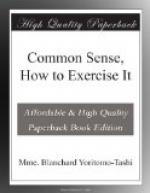“For this reason this sentimental defect will find common sense armed against this eventuality.
“There is another form or sentimentality not less common.
“It is that which extends itself to all the circumstances of life and transforms true pity into a false sensibility, the exaggeration of which deteriorates the true value of things.
“Those who give publicity to this form of sentiment are agitated (or imagine themselves to be agitated) as profoundly on the most futile of pretexts as for the most important cause.
“They do not think to ask themselves if their ardor is merited; also every such experience, taking out of them something of their inner selves, leaves them enfeebled and stranded.
“Every excursion into the domain of sentimentality is particularly dangerous, for tourists always fail to carry with them the necessary coinage which one calls common sense.”
After having put ourselves on guard against the surprizes of mental exaggeration, Yoritomo warns us of a kind of high respectable sentimentality which we possess, that is none the less censurable because under an exterior of the purest tenderness it conceals a profound egotism.
It concerns paternal love from which reasoning and common sense are excluded.
“Nothing” said he, “seems more noble than the love of parents for their children, and no sentiment is more august when it is comprehended in all its grandeur.
“But how many people are apt to distinguish it from an egotistical sentimentality.
“I have seen some mothers oppose the departure of their sons, preferring to oblige them to lead an obscure existence near to them, rather than impose upon themselves the sorrow of a separation.
“These women do not fail to condemn the action of others, who, filled with a sublime abnegation, allow their children to depart, hiding from them the tears which they shed, because they have the conviction of seeing them depart for the fortune and the happiness which they feel themselves unable to offer them.
“Which of these are worthy of admiration? Those who condemn their children to a life of mediocrity in order to obey an egotistical sentimentality, or those who, with despair in their hearts, renounce the joy of their presence, and think only of their own grief in order to build upon it the happiness of their dear ones.
“The common sense of this latter class inspiring in them this magnificent sentiment, and forcing them to set aside a sentimentality which is, in reality, only the caricature of sentiment, has permitted them to escape that special kind of egotism, which could be defined thus: The translation of a desire for personal contentment.
“Ought we then to blame others so strongly?
“It is necessary, above all, to teach them to reason about the ardor of their emotions, and only to follow them when they find that they are cleansed from all aspiration which is not a pledge of devotion.”




